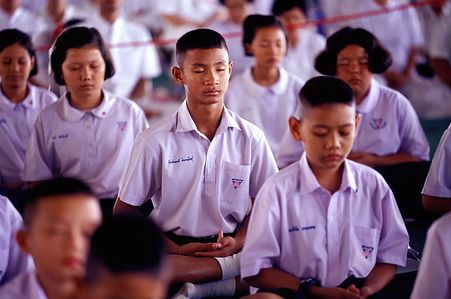Mindfulness in Children
Original Editor - Gabriele Dara
Top Contributors - Gabriele Dara, Merinda Rodseth, Kim Jackson, Jess Bell, Robin Tacchetti, Tarina van der Stockt, Chelsea Mclene and Ewa Jaraczewska
Introduction[edit | edit source]
The practice of mindfulness arose from ancient eastern cultures and it is, nowadays, widely practised and researched. This practice is defined as the ‘Psychological capacity to stay willfully present within an individual experience and with a non-judgemental or accepting attitude’ [1].
These abilities can formally be trained with specific/structured practices such as yoga, meditation or Tai Chi to cite some.
These practices have been researched and have proven to be helpful in inducing health-related benefits within groups of individuals of different characteristics [1] [2] [3].
The practice of mindfulness-based interventions (MBIs) and its effects have been researched also in children or younger individuals.
The research on the younger population aims to contrast the stress-related problems experienced during childhood, influencing the brain’s structures responsible for cognition [4] and the mental diseases, with wide prevalence in this age group [1].
Benefits associated with mindfulness in children[edit | edit source]
School setting[edit | edit source]
A systematic review with meta-analysis has investigated the effect of MBIs implemented with children (age span 6-19) within the school setting. The study reported benefits in the cognitive domain but also in the stress-management abilities, coping and resilience.
The interventions, within this study, were based on theoretical frameworks (existing mindfulness programs) or ‘manualised’ program and were conducted by trained-professionals or by the school teachers themselves. The program’s length averaged 420min of total practice within 4-to-12 weeks [1].
The quality of the studies involved in this systematic review can be questioned as not all the studies were peer-reviewed and some of the trials had no randomisation or control group.
Attention deficit hyperactivity disorder (ADHD)[edit | edit source]
It is reported that children who have been diagnosed with ADHD, present deficits in diverse domain of the brain functions. Some examples are working memory or sustained attention[5]. Due to the characteristics of this disease, individuals with ADHD, have been linked with a higher risk of social, educational and mental health issues. In recent years, literature has shown some interesting findings related to the application of MBIs to improve the quality of life of children with ADHD.
A systematic review from 2018 [5] investigated the role of MBIs in children with ADHD. The study included yoga, behavioural therapy programs, meditation, mindful martial arts and acceptance and commitment therapy (ACT). These therapies presented promising positive results for the psychological well-being of children with ADHD. However, the poor methodological quality of this research indicates that the findings cannot be conclusive and further research with higher quality is needed on the topic.
Implication for Physiotherapy[edit | edit source]
The involvement of Physical therapists in the delivery of such therapies might be of primary importance. Given the evidence presented above, physiotherapists can have a primary role in the assessment of the physical capabilities of the individuals whose MBIs will be addressed; in the decision of the interventions modality to be used and in carrying-on the intervention itself.
References[edit | edit source]
- ↑ 1.0 1.1 1.2 1.3 Zenner C, Herrnleben-Kurz S, Walach H. Mindfulness-based interventions in schools—a systematic review and meta-analysis. Frontiers in psychology. 2014 Jun 30;5:603.
- ↑ Gard T, Hölzel BK, Sack AT, Hempel H, Lazar SW, Vaitl D, Ott U. Pain attenuation through mindfulness is associated with decreased cognitive control and increased sensory processing in the brain. Cerebral cortex. 2012 Nov 1;22(11):2692-702.
- ↑ Brown KW, Ryan RM. The benefits of being present: mindfulness and its role in psychological well-being. Journal of personality and social psychology. 2003 Apr;84(4):822.
- ↑ Lupien SJ, McEwen BS, Gunnar MR, Heim C. Effects of stress throughout the lifespan on the brain, behaviour and cognition. Nature reviews neuroscience. 2009 Jun;10(6):434-45.
- ↑ 5.0 5.1 Evans S, Ling M, Hill B, Rinehart N, Austin D, Sciberras E. Systematic review of meditation-based interventions for children with ADHD. European Child & Adolescent Psychiatry. 2018 Jan 1;27(1):9-27.







